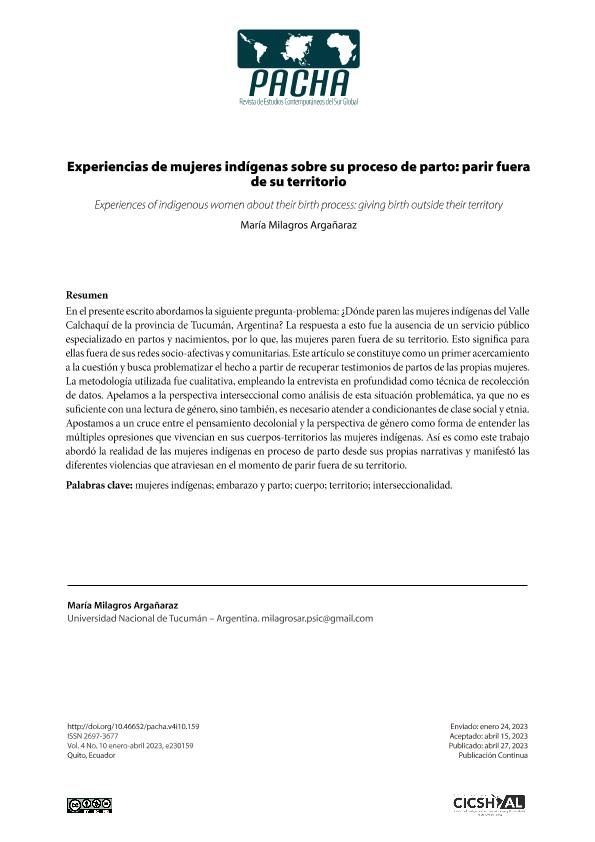Artículo
En el presente escrito abordamos la siguiente pregunta-problema: ¿Dónde paren las mujeres indígenas del Valle Calchaquí de la provincia de Tucumán, Argentina? La respuesta a esto fue la ausencia de un servicio público especializado en partos y nacimientos, por lo que, las mujeres paren fuera de su territorio. Esto significa para ellas fuera de sus redes socio-afectivas y comunitarias. Este artículo se constituye como un primer acercamiento a la cuestión y busca problematizar el hecho a partir de recuperar testimonios de partos de las propias mujeres. La metodología utilizada fue cualitativa, empleando la entrevista en profundidad como técnica de recolección de datos. Apelamos a la perspectiva interseccional como análisis de esta situación problemática, ya que no es suficiente con una lectura de género, sino también, es necesario atender a condicionantes de clase social y etnia. Apostamos a un cruce entre el pensamiento decolonial y la perspectiva de género como forma de entender las múltiples opresiones que vivencian en sus cuerpos-territorios las mujeres indígenas. Así es como este trabajo abordó la realidad de las mujeres indígenas en proceso de parto desde sus propias narrativas y manifestó las diferentes violencias que atraviesan en el momento de parir fuera de su territorio. In this paper we address the following question-problem: Where do the indigenous women of the Calchaquí Valley in the province of Tucumán, Argentina, stop? The response to this was the absence of a public service specialized in deliveries and births, therefore, women give birth outside their territory. This means for them outside of their socio-affective and community networks. This article is constituted as a first approach to the issue and seeks to problematize the fact from recovering testimonies of births from the women themselves. The methodology used was qualitative, using the in-depth interview as a data collection technique. We appeal to the intersectional perspective as an analysis of this problematic situation, since it is not enough with a gender reading, but also, it is necessary to attend to conditions of social class and ethnicity. We bet on a cross between decolonial thought and the gender perspective as a way of understanding the multiple oppressions that indigenous women experience in their bodies-territories. This is how this work addressed the reality of indigenous women in the process of childbirth from their own narratives and manifested the different types of violence that they experience at the time of giving birth outside their territory.
Experiencias de mujeres indígenas sobre su proceso de parto: parir fuera de su territorio
Título:
Experiences of indigenous women about their birth process: giving birth outside their territory
Fecha de publicación:
04/2023
Editorial:
Centro de Investigaciones en Ciencias Sociales y Humanidades desde América Latina
Revista:
Pacha
ISSN:
2697-3677
Idioma:
Español
Tipo de recurso:
Artículo publicado
Clasificación temática:
Resumen
Palabras clave:
MUJERES INDIGENAS
,
EMBARAZO Y PARTO
,
CUERPO
,
TERRITORIO
Archivos asociados
Licencia
Identificadores
Colecciones
Articulos(CCT - NOA SUR)
Articulos de CTRO.CIENTIFICO TECNOL.CONICET - NOA SUR
Articulos de CTRO.CIENTIFICO TECNOL.CONICET - NOA SUR
Citación
Argañaraz, Maria Milagros; Experiencias de mujeres indígenas sobre su proceso de parto: parir fuera de su territorio; Centro de Investigaciones en Ciencias Sociales y Humanidades desde América Latina; Pacha; 4; 10; 4-2023; 1-17
Compartir
Altmétricas




